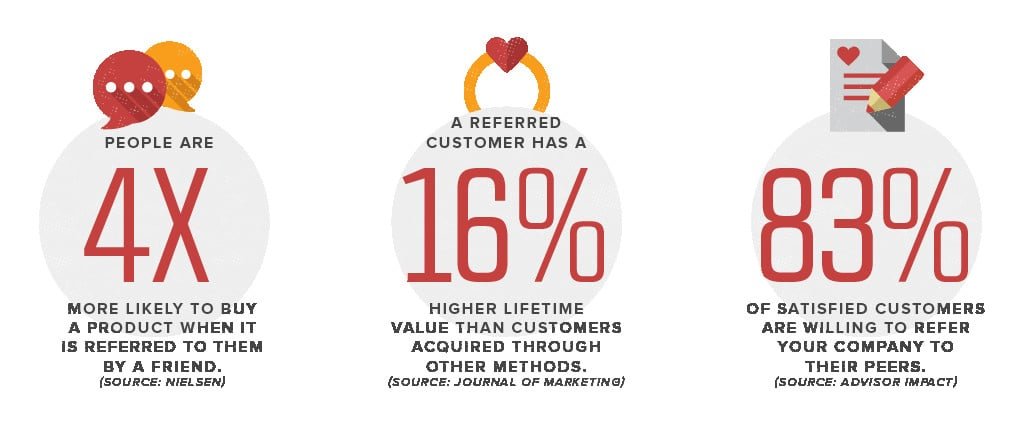
In today’s digital age, businesses need innovative ways to rise above the noise and build lasting connections with their customers. One proven yet continually evolving strategy is referral marketing. Referral marketing turns loyal customers into brand advocates, amplifying brand visibility and fostering trust within your target audience. But why is referral marketing making such a significant impact in the B2B space?
Understanding the Power of Referral Marketing Strategies
Referral marketing leverages the trust people place in recommendations from those they know. According to research, 92% of consumers trust referrals from individuals they are acquainted with, making it one of the most reliable and powerful forms of advertising.
Moreover, referrals bring long-term value. Customers acquired through referrals have a 37% higher retention rate and a 16% greater lifetime value than non-referred customers. Additionally, referral marketing generates 65% of new business opportunities, making it an unparalleled lead-generation method for both small and large businesses.
Referred customers also convert at a 30% higher rate than leads from other channels, and these high-quality leads can increase profit margins by up to 25%. Clearly, referrals are more than just a tool for customer acquisition—they drive profitability and foster customer loyalty.
When Referrals Work and When They Don’t
While referrals can be a game-changer for businesses, they’re not without challenges. To succeed, trust must be at the core of your referral strategy. When referrals are based on personal biases or familial connections rather than merit, they can damage the trust a company has built with its customers and employees.
Another common pitfall occurs when referred individuals aren’t adequately prepared for the opportunity, leading to mismatched expectations and wasted resources. Referral success also depends on cultural alignment. If a referred individual doesn’t fit the company culture, it can create friction, negatively impacting productivity and relationships.
Lastly, businesses must recognize and reward those who make successful referrals. Failure to do so can discourage future referrals and lead to missed opportunities.

Assessing the Suitability of Referral Marketing for Your Business
Before diving into referral marketing, businesses need to evaluate whether their customer base is suitable for such a strategy. Analyze customer demographics, purchasing behavior, and satisfaction levels to determine if your existing customers are likely to act as brand ambassadors.
Additionally, consider whether your product or service stands out in the marketplace. Is there enough value or uniqueness to compel customers to make referrals? Understanding these factors will help you determine whether referral marketing is a good fit for your business.
Key Factors Affecting Referral Success
Several factors contribute to the success of a referral marketing program:
- Aligned incentives: The rewards for both the referrer and the referred customer must be compelling enough to motivate action. Whether it’s a monetary reward, exclusive experience, or service upgrade, the incentive should resonate with both parties.
- Simplified referral process: The easier it is for customers to make referrals, the more likely they are to do so. Businesses can streamline the referral process using integrated tools or platforms that remove hurdles and make the process transparent.
- Trust and relationships: At the heart of any successful referral program is trust. Strong customer relationships are essential to ensuring that referrals are authentic and effective.
Creative Referral Marketing Strategies That Resonate
Innovative businesses are finding creative ways to enhance their referral programs. Instead of relying solely on monetary rewards, consider offering unique incentives like exclusive experiences or early access to new products. Gamifying the referral process can also increase engagement, turning referrals into competitions or challenges.
Another strategy is collaboration with complementary brands. By aligning with other companies that share your target audience, you can tap into a broader network of potential customers while offering a richer value proposition.
Email marketing also plays a role in creative referral strategies. Businesses can integrate referral links into thank-you emails or newsletters, giving customers easy access to referral programs and incentives.

The Significance of KPIs in Referral Programs
Like any marketing initiative, referral programs need to be measured for success. Key performance indicators (KPIs) are essential for assessing the effectiveness of your program. Common KPIs for referral marketing include:
- Net Promoter Score (NPS): Measures customer loyalty and likelihood of referrals.
- Customer Satisfaction: Gauges how satisfied your current customers are with your product or service.
- Customer Retention Rate: Tracks how well your business retains customers over time.
- Customer Lifetime Value (CLV): The total revenue expected from a customer over their entire relationship with your business.
- Referral Rate: The percentage of customers who actively refer new business.
- Conversion Rate: How many referred leads convert into paying customers.
Monitoring these KPIs helps businesses optimize their referral programs and ensure that they’re driving meaningful results.
Success Stories of Referral Marketing in the Enterprise B2B Space
Several companies have leveraged referral marketing to achieve remarkable success, particularly in the B2B sector. Here are three notable examples:
Dropbox
Dropbox’s referral program is one of the most famous success stories. For each referral, users received 1 GB of additional storage, incentivizing them to share the platform with friends. This simple yet effective strategy led to a 3900% increase in user growth, with Dropbox gaining 4 million new users in just 15 months.

Blackbaud
Blackbaud, a leading cloud software company, launched its “Blackbaud Champions” referral program to turn customers into brand ambassadors. These advocates shared their positive experiences, resulting in a 14% revenue growth in 2022. This program underscores the power of customer advocacy in driving business growth.
Airtable
Airtable, a popular project management tool, implemented a referral program that rewarded users with $10 credits for each successful referral. This approach helped expand their user base while boosting user satisfaction and loyalty.
Building a Strong Referral Community
At the heart of any successful referral program is a strong community of brand advocates. These are not just customers—they are individuals who genuinely believe in your product or service and are willing to promote it to others. By building and nurturing this community, businesses create a sustainable cycle of referrals, customer acquisition, and loyalty.
Referral marketing is a powerful strategy that goes beyond customer acquisition. It helps businesses build a community of satisfied, loyal customers who act as brand advocates, fostering trust and driving long-term success.